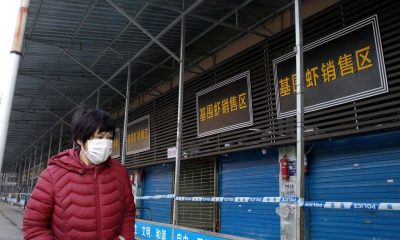Business
TikTok Draws Interest From Bidders Other Than Microsoft
(Bloomberg) — Microsoft Corp. isn’t the only company interested in buying TikTok’s U.S. operations, according to people familiar with the matter.U.S. government officials probing national-security concerns around the Chinese-owned video-sharing app have had talks with at least one other large company as well as investors in TikTok parent ByteDance Ltd. who are interested in taking a stake in TikTok, according to one of the people, who requested anonymity because the discussions are private. This person declined to identify these companies.ByteDance is considering changes to the structure of TikTok because President Donald Trump is weighing ordering a divestiture of TikTok’s U.S. business, a decision that could come at any time.Venture investors in ByteDance have approached Chief Executive Officer Zhang Yiming with a range of proposals to address U.S. concerns that the app, especially popular with teens, is a security threat, people familiar with the matter have said. Any solution would likely have to pass scrutiny from U.S. regulators in the Committee on Foreign Investment in the United States, as well as U.S. antitrust regulators.The deal provides a rare opportunity to profit off the momentum of the fastest-growing social media app in the U.S. Still, not all companies likely to be attracted to such a deal will even be in the running. TikTok’s valuation is estimated at $20 billion to $40 billion, so few companies would be able to afford it. Most of those that would are likely to find it politically difficult to make the move.The CEOs of Facebook Inc., Alphabet Inc.’s Google, Amazon.com Inc. and Apple Inc. testified this week in the U.S. House of Representatives to answer lawmakers’ questions about their enormous market power. While any one of the four companies could fit TikTok into their product offerings, deals by these giants are already under a microscope.Google, whose YouTube is a competing video offering, is already facing a European Union probe for its much smaller acquisition of Fitbit Inc. Apple doesn’t tend to make acquisitions anywhere near large as TikTok. And Facebook’s years-ago purchases of smaller rivals Instagram and WhatsApp have been brought up anew amid the antitrust scrutiny. The world’s largest social network has already worked to turn lawmakers against TikTok, and is unlikely to court further risk to its already tenuous position on data security. Facebook also looked at purchasing Musical.ly, the predecessor to TikTok, in 2016, and passed.Microsoft, with a market value of $1.55 trillion, is bigger than Google or Facebook, but currently has a better reputation in Washington. The company wasn’t invited to the antitrust hearing on July 29, and has largely escaped recent criticism of Big Tech’s outsize influence. It’s unclear whether Microsoft would seek to integrate TikTok into its own operations, or join with other investors from private equity or venture capital to finance spinning out TikTok as a separate entity based in the U.S. With the second option, investors could seek to gain even more from a TikTok stock listing in the future.Media companies, such as Walt Disney Co. and Verizon Communications Inc., have been interested in purchasing social-media assets in the past. Disney in 2016 considered but ultimately decided against purchasing Twitter Inc., for instance. TikTok’s U.S.-based CEO, Kevin Mayer, was formerly the head of streaming for Disney, and may be better positioned to help broker a deal in the media world.Other social-media companies, such as Twitter and Snapchat parent Snap Inc., have smaller valuations than TikTok and therefore are unlikely bidders. They would need to use stock or outside financial help to complete such a transaction.It’s still not clear how a U.S. divestiture of TikTok would work, and how completely the app would have to separate from its current Chinese ownership. The company hasn’t said how such a move would affect employees, the technology or its product. However the ownership shakes out, there is one group that no potential buyer or investor wants to alienate: TikTok’s 165 million American users.For more articles like this, please visit us at bloomberg.comSubscribe now to stay ahead with the most trusted business news source.©2020 Bloomberg L.P.
Business
Lopez holding firm reports 26% profit decline during pandemic
First Philippine Holdings Corp. (FPH) saw its net profit in the first semester fell by 26% to P3.5 billion as the pandemic pulled down its income from operations.
In a regulatory filing, the Lopez-led holding company saw its topline falter by 21% to P53.9 billion on reduced power and real estate sales.
The company incurred one-off losses due to coronavirus pandemic-related expenses, which reached P235 million. Excluding these, its recurring net income in the period stood at P10.2 billion, lower by 21% from over a year ago.
FPH’s electricity sales declined by 18% to P10.4 billion on lower revenues from First Gen Corp.’s natural gas plants, hydro platform, and geothermal unit.
The power company in a separate disclosure said its recurring attributable profit dwindled by 15% to P6.7 billion in the first half of the year as the decline in power demand worsened in the second quarter when the economy entered into recession.
Its total revenues from power sales fell by 15% to P47.7 billion in the January-June period. First Gen’s natural gas plants delivered P4.5 billion to the holding firm’s recurring revenues, down 16% as it continues to suffer from low electricity sales in the second quarter. Making up 61% of their parent’s revenues, the gas plants posted a 17% drop in earnings due to lower average natural gas prices and a decline in their dispatch.
Energy Development Corp. posted a slightly lower earnings’ share of P2.4 billion because of a slump in revenues from lower electricity prices. It netted P2.4 billion in revenues, forming 36% of First Gen’s topline.
Its hydro platform, First Gen Hydro Power Corp., brought in P200 million, a 68% share decline, due to lower prices at the Wholesale Electricity Spot Market (WESM). Its revenues, which account for 2% of its parent’s earnings, plunged by 47% to P900 million on poor spot market sales.
Meanwhile, FPH’s real estate sales dropped by over half, or 52%, to P2.2 billion because of the combined reduced sales take-up and slow construction completion of Rockwell Land Corp. following quarantine restrictions.
It also earned 23% less from contracts and services, which stood at P3.2 billion, because of the slowdown in construction activities and drilling services of First Balfour, Inc. and ThermaPrime Drilling Corp., as well as the reduced lease revenues of Rockwell’s commercial spaces due to rent concessions.
Merchandise sale earnings dropped by 26% to P805 million as First Philippine Electric Corp. sold fewer electrical transformers after its plant went on a shutdown.
On Friday, shares in FPH inched up 0.25% to close at P59.15 each, while First Gen’s shares declined by 3.83% to close at P22.60 apiece. — Adam J. Ang
Business
How a hair-care company went from salon supplier to sanitizer powerhouse
When AG Hair moved into its new, 70,000-sq.-foot, state-of-the-art manufacturing facility in Coquitlam, B.C., two years ago, it was part of a plan to supercharge expansion of its hair care product line to salons in international markets. Europe was next on its list. Then COVID-19 hit.
Not only was the European expansion put on hold, but salons in major markets across Canada and the United States were temporarily closed. Very few were purchasing hair products, so manufacturing was halted in mid-March, leaving most of the company’s 82 employees out of work.
AG Hair could have waited out the pandemic but instead decided to lean into its entrepreneurial culture and make a sharp pivot. It began providing hand-sanitizing products for front-line health-care workers, addressing a global shortage.
“We realized there was this massive need for health-care professionals, and we wanted to make a difference and be able to provide them with the products they needed,” says AG Hair CEO Graham Fraser.
AG Hair received Canadian and U.S. approvals a week after applying for the licences needed to make sanitizer, and produced samples to show local authorities within 48 hours.
AG Hair’s Coquitlam facility has pivoted to making hand sanitizer (Photograph by Alana Paterson)
“That rapid response time, and the fact that we had gone through all of the Health Canada regulatory hurdles, showed [the local health authorities] that we were a partner they could trust and someone they could look to, to deliver the products they needed,” Fraser says.
Within a month, the company started pumping out the products, first for the health-care industry, then for consumers on its own website and on Amazon. About 10 per cent of AG Hair’s hand-sanitizer production also went to people in need, as identified by organizations such as United Way.
Parallel 49 Brewing Company is also using AG Hair’s Coquitlam manufacturing facility to produce its own blend of liquid hand sanitizer for front-line health and emergency workers, in partnership with the B.C. government.
Fraser credits his team for its energy and creativity in making the hand-sanitizer production happen, and helping put AG Hair staff back to work.
“We realized we had an opportunity . . . and then it became this incredible, almost war-room mentality and collaboration with our owners, our executive team and our people to say, ‘How are we going to get through this?’ ” Fraser recalls. “I think our success speaks to the type of people we have and the entrepreneurial spirit of pursuing every avenue we have, understanding how we can produce the products and making it happen.”
AG Hair’s commitment to investing in future growth is a big part of what makes it a Best Managed company, says Nicole Coleman, a partner at Deloitte and co-lead of its Best Managed Program in B.C.
“Capability and innovation come through quite strongly with this company,” says Coleman, who is also AG Hair’s coach at Deloitte. “I don’t think they would be able to pivot as quickly if they weren’t so strategic and had the internal capabilities to do it.”
The manufacturing facility was a big investment, but one Coleman says has already paid dividends.
“They were looking forward with a strategic plan in mind about future growth and how they could expand, rather than just focusing on the day to day,” she says. “Best Managed companies are always pushing the envelope and are conscious about planning for the future.”
AG Hair was founded in Vancouver in 1989 by hairstylist John Davis and graphic artist Lotte Davis. The husband-and-wife team began bottling hair products in their basement and selling them direct to salons from the back of a station wagon.
The company eventually moved its manufacturing off-site, to a third party. One day, John went to watch the operations and was surprised to see salt being poured into the mixture. Although he was told salt is commonly used as a thickener, he didn’t like the potential side effects of dry hair and skin.
It was at that moment John decided the company would oversee its own manufacturing. “Through that experience, John also became an expert in product development,” says Fraser, who came to the company in 2000 as director of sales.
After having worked for more than two decades at PepsiCo and Kraft Foods, Fraser was eager to work at a smaller, more agile company where he felt he could help make a difference.
“It was perfect because I got to bring a lot of structure and process that I learned in those organizations, but I also learned an awful lot about being an entrepreneur from John and Lotte: that sense of urgency, the decision-making process, the need to get things done and drive things forward and pursue opportunities,” he says.
Fraser has helped drive AG Hair’s expansion into the U.S. and internationally, including Australia, Taiwan, and Central and South America. A portion of its sales go to One Girl Can, a charity founded by Lotte that provides schooling, education and mentoring for girls in sub-Saharan Africa.
Fraser also oversees the development of new, trending products, including a new deep-conditioning hair mask made with 98 per cent plant-based and natural ingredients. Hand-sanitizing spray and gel will be the latest addition to the company’s product lineup.
“We don’t see the demand [for hand-sanitizing products] going away,” he says. “As the isolation policies start to get lifted, people are going to need forms of security and protocols as they get back into regular life and work. We see there’s going to be a need for these types of products long-term.”
This article appears in print in the June 2020 issue of Maclean’s magazine with the headline, “Working out the kinks.” Subscribe to the monthly print magazine here.
The post How a hair-care company went from salon supplier to sanitizer powerhouse appeared first on Canadian Business - Your Source For Business News.
Business
Amazon Considers Relocating Some Employees Out of Seattle
(Bloomberg) — Amazon.com Inc. is offering Seattle-based employees a choice of smaller offices outside the city, suggesting the Covid-19 outbreak and a new local employers tax have pushed the e-commerce giant to consider alternatives to its hometown.In a message to employees Thursday, Amazon asked which communities near Seattle — including Tacoma and Redmond, Washington — they’d prefer. The title on the message, which was shared on Reddit and later deleted, was “office workplace options.” Amazon declined to comment on the matter.Amazon, which reported a total global workforce of almost 877,000 as of June 30, has been expanding beyond Seattle for years. It is building a second major office center in suburban Virginia near the nation’s capital and has satellite locations in cities including New York, Austin and Los Angeles.The company has threatened to focus employment growth outside Seattle due to a rocky relationship with city officials and new taxes imposed on big employers. The message suggests Amazon could significantly shrink its presence in its hometown, where it employs about 50,000 people in a mixture of offices it owns and leases. In 2019, it announced it would relocate its worldwide operations division, which oversees Amazon’s shipping and logistics, to nearby Bellevue where it currently employs 3,000 people.Even before the pandemic, Amazon considered building more satellite offices outside the city, according to a person familiar with the matter. The company plans to expand its Bellevue offices, which it has had since 2017. Such locations are seen as an amenity for employees tired of commuting to Seattle and as a way to reduce the company’s exposure to the city’s taxes targeting big employers, said the person, who asked not to be identified discussing private matters.Two years ago, Amazon helped defeat an effort in Seattle to raise money for homeless services and affordable housing by levying a per-employee tax on large businesses. The “head tax” would have raised about $47 million a year.The political climate has since shifted against the company after Amazon’s big spending on a Seattle City Council election backfired last year. In July, the council passed a new levy that will tax large businesses on employees who make at least $150,000 per year. The tax is expected to raise more than $200 million annually and cost Amazon even more than the earlier proposal.For more articles like this, please visit us at bloomberg.comSubscribe now to stay ahead with the most trusted business news source.©2020 Bloomberg L.P.
-
 Business4 weeks ago
Business4 weeks agoBernice King, Ava DuVernay reflect on the legacy of John Lewis
-
World News3 weeks ago
Heavy rain threatens flood-weary Japan, Korean Peninsula
-
 Technology3 weeks ago
Technology3 weeks agoEverything New On Netflix This Weekend: July 25, 2020
-
Finance3 months ago
Will Equal Weighted Index Funds Outperform Their Benchmark Indexes?
-
Marketing Strategies7 months ago
Top 20 Workers’ Compensation Law Blogs & Websites To Follow in 2020
-
 World News7 months ago
World News7 months agoThe West Blames the Wuhan Coronavirus on China’s Love of Eating Wild Animals. The Truth Is More Complex
-
Economy10 months ago
Newsletter: Jobs, Consumers and Wages
-
 Finance8 months ago
Finance8 months ago$95 Grocery Budget + Weekly Menu Plan for 8

